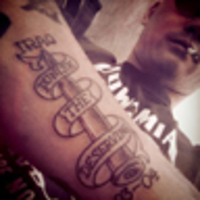When I graduated from high school in 1995, I flirted with the idea of enlisting in the military but decided against it. Why would I want to sign up, receive all that training, and end up sitting on a base somewhere just killing time. Instead, I skipped the training and worked a series of nothing jobs.

Then 9/11 happened, and I started hearing that the U.S. military was now hiring—and pretty much anyone they could. So I signed up, and after graduating from basic training studied abroad, spending 2003 and 2004 in Iraq, where our battalion commander sent us outside the wire several times a day “to locate, capture, and kill all anti-Iraqi forces.” After that, college seemed like it would be a breeze, especially with the post-9/11 GI Bill meaning Uncle Sam would pick up the check.
There’s a scene in Forrest Gump where the title character enlists in the United States Army during the Vietnam War. While in basic training, Gump, who’s essentially autistic, is heralded as a goddamn genius by his drill instructors because he follows simple instruction. He does what he’s supposed to in the military: exactly what he’s told.
It took me a bit to figure this one out—like a lot of things in life after war—but college is the same thing, really. My teachers back in high school, where I graduated in the bottom 10 percent of my class, may not believe it, but once I applied what I learned while serving to school, it became easy. It doesn’t take a genius to receive an honorable discharge or get a diploma. You just got to suck it up and drive on. You’re handed a syllabus, given textbooks, told what to read, how to read it and when to read it, and tested to see if you’ve comprehended or at least memorized the material that’s assigned. If you have any questions, there are professors there to answer them.
I made the Dean’s List my first semester in community college in California. I applied to a university and was accepted and moved to the East Coast. I got there in the dead of winter, mid-school year, with no warm footwear other than the desert-tan combat boots I wore in Iraq, which I had to dig out from a storage box. My blood type was still inscribed on the side. I laced those on and bloused them the same exact way I did in the Army, and wore them through the snow to my first day of class.
I almost shed a tear when I realized that these boots had taken me to a university education, something that I’d never even dreamed about—and I doubt my family or friends had either—before joining the Army. It was the first time I remember feeling that my country was thanking me, taking care of me for my service—which made me thankful for my country. Now I’m here, and I’ve got to remain focused and graduate.
And yet—88 percent of Iraq and Afghanistan War veterans currently enrolled in school “will drop out by next summer,” according to David Wood. Student Veterans of America dismissed that number as “unfounded and simply not true”—noting that “no organization, including the federal government, is currently able to accurately track the national graduation rates of student veterans.” Which is itself quite depressing.
Woods’s Huffington Post article also contends that “student veterans are seven times more likely to attempt suicide than their civilian counterparts,” which does ring true. The American Psychological Association reports that “nearly half of college students who are U.S. military veterans reported thinking of suicide and 20 percent said they had planned to kill themselves.”
I often wonder if the college classroom experience for our current veterans is anything like what the members of the Greatest Generation sat through after they came home. Imagine the guys who fought in the Battle of the Bulge then finding themselves stuck in some college classroom surrounded by classmates who had never heard of war bonds, with a professor in a tweed coat going on:
“Japan, perhaps, but we should have never gone to Europe since they didn’t really attack us. And don’t even get me started on the atom bomb—do you know how many innocent civilians that killed? Oh, and Pearl Harbor? Inside job. Totally.”
It felt like that during the Bush years, but not so much anymore. Now I imagine the classrooms feel more like what Korean War veterans experienced when they came home: nearly forgotten, somewhere between out of place and simply invisible.
The students around me were in the fourth grade when President George W. Bush told the nation: “Good evening. Today, our fellow citizens, our way of life, our very freedom came under attack in a series of deliberate and deadly terrorist acts.” I remember where I was when that was said, and the life and career choice I made shortly after.
Many of the students I share a campus with view veterans, both on and off campus, as mostly too dumb to be in college to begin with or brainwashed to the point where they’re all unable to think for themselves or ticking time bombs one bad grade away from bringing an assault rifle to class. All of which—it should go without saying, but doesn’t—is usually the furthest thing from the truth.But there are parts of college life that chafe in ways that are hard for those who haven’t experienced the military to imagine, weird little slights and big bureaucratic frustrations.
It’s not necessarily dodged bullets, IEDs that didn’t explode, or dead bodies that haunt or make me stop feeling the need to go on. No, it’s waiting on the phone for well over an hour just to have the person on the line say that the disability claim filed more than a year ago is still in the system but hasn’t been processed yet, and receiving no answers at all about when it’ll go through. It’s a letter in the mail saying the housing allowance from the GI Bill is being “readjusted” down a couple hundred dollars. Signing up for classes and expecting that housing allowance to be in an account on the day promised but discovering it’s not, and it may be a few weeks before it’s corrected—it’s hard to say when exactly.
It’s walking into the VA hospital in pretty bad shape, waiting for hours in the lobby, and asking for something for insomnia and anxiety attacks, and being told to cut down on coffee.
It’s the stranger who says “Thank you for your service,” waits a beat, and adds, mantralike, “I support the troops but not the war.”
The yellow ribbons and no-blood-for-oil bumper stickers while stuck in bumper-to-bumper traffic on the way to fill up on five-dollar-a-gallon gasoline.
Fill-ups aside, money isn’t the issue for most veterans in school since even if we major in philosophy, the GI Bill means we won’t be grinding beans to pay down our debt.
But many of us joined the military after high school because we knew that either college wasn’t going to be a possibility, or even if it was it just wasn’t going to be our thing. That, and the realization that there has to be more to life than asking strangers: “Can I take your order?” Many of the men I served with were the kind of guys that would have been great at manufacturing work—but we know where those jobs have gone.
Not too long ago in Detroit I attended a job fair specifically for veterans. There were about 25,000 jobs nominally available, and far less than 5,000 vets there to fill them—every one of those men and women there hoping to hear: “You’re hired.”
Instead, the refrain for every position that could possibly put someone into the middle class was “do you have an engineering degree?”
The remaining jobs offered—the ones that required some college, and those that didn’t—paid 10 or maybe 15 bucks an hour, with few or no benefits.
I walked away from that convention center feeling highly depressed, and I’ve found myself at least slightly depressed ever since.
“What am I going to do after I graduate with a history degree,” I started asking myself, and I began seriously thinking about dropping out. Thoughts that I’ve never had before—like what’s the point of it all?—started entering, unbidden, into my everyday thoughts.
I had similar thoughts midway through my tour in Iraq, where I wanted nothing more than to come home. I saw no light at the end of the tunnel, and I recall I just wanted it all to end. But then when I did come home I found myself at times strangely missing the war.
I wonder if college is the same thing. I try to remember: you just got to suck it up and drive on.






